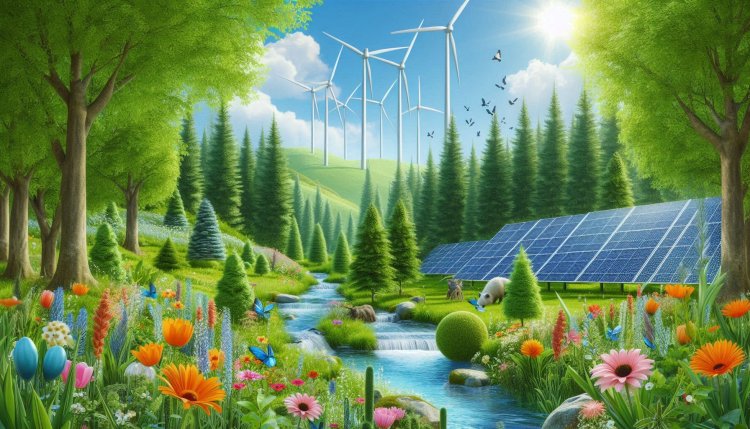Renewable Energy and Ecosystem Services
Explore the relationship between renewable energy and ecosystem services, highlighting the benefits of sustainability and conservation practices.

Renewable Energy and Ecosystem Services
Renewable energy sources such as solar, wind, hydro, and geothermal power play a crucial role in reducing greenhouse gas emissions and mitigating climate change. In addition to their environmental benefits, renewable energy technologies also have positive impacts on ecosystem services.
1. Biodiversity Conservation
Renewable energy projects, such as wind and solar farms, can help conserve biodiversity by providing habitat for a variety of species. When properly sited and managed, these projects can coexist with natural ecosystems and wildlife. In some cases, renewable energy installations have been designed to enhance local biodiversity by incorporating native vegetation and wildlife-friendly features.
2. Water Conservation
Hydropower and other forms of renewable energy can contribute to water conservation by reducing the need for water-intensive energy generation methods such as fossil fuel power plants. Hydropower projects, for example, can help regulate water flow and improve water quality in rivers and streams. By reducing water consumption in the energy sector, renewable energy technologies support healthy aquatic ecosystems.
3. Soil Protection
Renewable energy development can help protect soil health by avoiding land degradation and soil erosion associated with conventional energy extraction methods. Solar panels and wind turbines are typically installed on existing infrastructure or barren land, minimizing the impact on soil quality. By preserving soil resources, renewable energy projects support agricultural productivity and ecosystem resilience.
4. Carbon Sequestration
Renewable energy sources such as forests and wetlands store carbon and help mitigate climate change by sequestering carbon dioxide from the atmosphere. By preserving and restoring natural habitats that act as carbon sinks, renewable energy projects can enhance carbon sequestration capacity. This ecosystem service is essential for offsetting carbon emissions and maintaining a stable climate.
5. Pollination Services
Renewable energy installations can provide habitat for pollinators such as bees, butterflies, and birds, which play a vital role in pollination and food production. By supporting pollinator populations, renewable energy projects contribute to agricultural productivity and ecosystem resilience. Pollination services are essential for maintaining biodiversity and supporting healthy ecosystems.
6. Recreational Opportunities
Renewable energy projects, especially those located in natural landscapes, can create recreational opportunities for local communities and visitors. Wind farms, solar parks, and hydroelectric facilities can be integrated into public spaces for hiking, birdwatching, and other outdoor activities. By blending renewable energy infrastructure with recreational amenities, these projects promote environmental awareness and community engagement.
7. Air and Water Quality
Renewable energy technologies produce clean energy without emitting harmful pollutants that degrade air and water quality. By replacing fossil fuel-based power plants, renewable energy sources help reduce air pollution and improve public health. Cleaner air and water contribute to the overall well-being of ecosystems and human populations, supporting a sustainable and healthy environment.
8. Ecosystem Resilience
Renewable energy projects can enhance ecosystem resilience by promoting biodiversity, protecting natural habitats, and reducing environmental degradation. By diversifying energy sources and minimizing ecological impacts, renewable energy technologies support the adaptive capacity of ecosystems to withstand climate change and other stressors. Ecosystem resilience is essential for maintaining ecosystem services and ensuring the long-term sustainability of natural systems.
Conclusion
Renewable energy and ecosystem services are interconnected, with renewable energy technologies playing a significant role in supporting and enhancing the benefits provided by natural ecosystems. By promoting biodiversity, conserving water and soil resources, sequestering carbon, and supporting pollination services, renewable energy projects contribute to ecosystem health and resilience. It is essential to consider the positive impacts of renewable energy on ecosystem services when planning and implementing sustainable energy solutions for a greener future.
What's Your Reaction?

















